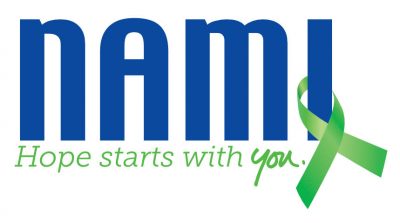
(1-27-17) Two items today. The first was prompted by a recent letter to the editor that caught my eye. The second is a follow up to the Internet petition being circulated by activists who claim the National Alliance On Mental Illness, the country’s largest grass roots mental health organization, isn’t paying enough attention to the sickest of the sick.
First the letter:
Dear Editor: My son battles with opioid addiction. This situation has taken its toll on me and my family. My point of view on the issue has changed; as a father, citizen, and (state) legislator. I have seen first-hand how our criminal justice, mental health, and crisis intervention systems may not be meeting the challenge of this crisis.
Through my experience I have learned that families often don’t understand the disease of addiction. I’ve learned that it is often difficult and expensive to access to care or to find a doctor who can prescribe medicine…that may be helpful in treating addiction. I have also learned that first responders have seen a tremendous increase in Opioid related incidents and are frequently put in difficult situations.
My family’s story is not unique; it can happen to anyone and with my son’s permission I’m sharing our story in an effort to help others. Addiction is a family disease and I know it’s both difficult and personal for everyone. Action on this crisis is on my agenda in the (Virginia) General Assembly, including increasing access to overdose reversal drugs, being an ally in the fight to reform our mental health system, and finding new ways for those in an addiction crisis to get to the resources they need.
State Delegate John Bell
I’m often asked how we can persuade politicians to get involved in bettering our mental health care system. My answer: find an elected official who has a family member or close friend with a mental illness or addiction problem.
State Sen. Creigh Deeds became a powerful voice in Virginia and nationally after he couldn’t get help for his son, Gus, who tragically ended his own life after attacking his father.
As a newspaper reporter, I’d written several stories about mental illness, mostly in the mid-1970s when I worked in Oklahoma and used to write about crime and criminals held in the Oklahoma State Penitentiary. It wasn’t uncommon for inmates with mental illnesses to be heavily medicated and locked in cells 24 hours a day, which I felt was barbaric. Because of that, I thought I knew a lot about mental illness. But I didn’t until my son became ill.
That’s when I went from being a reporter to becoming an advocate.
Whenever I receive phone calls from reporters interested in mental illness, I ask if the story was assigned to them or if it was their idea. If they say it was their idea, there’s a good chance they have a personal experience. If it impacts your life, you learn about it and react.
I’ve never been embarrassed to talk about my son. Why should I be? Like many of you, as soon as I mention that he has been diagnosed with bipolar disorder, the person listening to me opens up and generally tells me about someone in their family or a friend who has a mental disorder. I like the quote that my friend, Jennifer Marshall, co-founder of This Is My Brave, has on her webpage.
“One day we will live in a world where we won’t have to call it “brave” when talking about mental illness. We’ll just call it talking.”
Thank you Virginia State Delegate John Bell for joining us in speaking out. You and your son are not walking this path alone.
Moving to item two today.

An Internet petition asking NAMI to focus more of its programs and lobbying efforts on behalf of the 4 % of individuals with serious mental illnesses has garnered more than 550 signatures. I posted a blog about the petition and NAMI CEO Mary Gilberti and the NAMI national board’s response last week.
Since then, I have received numerous emails from the petitioners complaining that CEO Gilberti’s response wasn’t satisfactory. They plan on continuing to complain and some are threatening to break away from NAMI and launch a new grassroots organization. One wrote:
Many of NAMI’s policies and signature programs are valuable, key pieces of a strong mental health system. However, we believe that there is a lack of focus on specific programs needed for our loved ones, many who lack capacity to keep themselves safe and are therefore unable to assimilate into voluntary-based community mental health systems. Sadly, NAMI has allowed mission creep to put our families at risk. We simply cannot accept the status quo or waiting another 50 years for what our families need now.
The petition signers, many of whom are long time NAMI members, argue that NAMI needs to be more vocal in pushing for five changes.
1. While NAMI is on record in support of Assisted Outpatient Treatment, it states that AOT only should be implemented as a last resort when all other treatment approaches have failed. Support for AOT has been waning in NAMI with the arrival of more and more consumers (persons with mental illnesses) in its ranks. Many patients object to it, saying it is forced treatment. The petition signers argue that AOT should be the first, not last, treatment. AOT has been declared an evidence based practice and studies have found it saves money and reduces homelessness, arrests, and hospitalization.
2. The signers want NAMI to demand that state Protection and Advocacy (PAIMI) groups focus on abuse and neglect in state hospitals and jails and prisons, rather than advising their ill clients on ways to avoid hospitalization and actively lobbying against the use of AOT.
3. The signers want SAMHSA to implement evidence based programs that target biological based illnesses not behavioral ones.
4. They want HIPAA laws loosened so that parents and caregivers can have limited access to a patients’ records, rather than keeping them confidential.
5. They want NAMI to push for repeal of the IMD Exclusion that limits the size of treatment facilities to 16 beds.
If those objectives sound familiar, it’s because all of them were included in the first draft of the Helping Families In Mental Health Crisis Act that Rep. Tim Murphy (R.-PA.) introduced nearly four years ago. But those five goals were either weakened or deleted after they were strongly opposed by Democrats, disability rights groups, Mental Health America and other consumer based organizations.
In a recent press release, Rep. Murphy wrote that he intends to introduce another round of mental health bills that would get those five changes made.
We’re still not done. I will continue advancing reforms so none remain in the shadows because we’ve set our eyes on one goal: to fix our nation’s broken mental health system so it works for all.
Given that Murphy’s rewritten bill was signed into law in December by President Obama, the heat on Congress to pass mental health legislation has dissipated. It’s unlikely that he will have much luck rousing support for revisiting language that already has been debated and rejected. But Murphy insists he will not stop trying.
I was assured by a NAMI official that CEO Gilberti is keenly aware of the disgruntled members’ complaints but I was told that NAMI received numerous emails and calls praising her response to the the petition signers who were described to me as a vocal but minority group within the organization.



